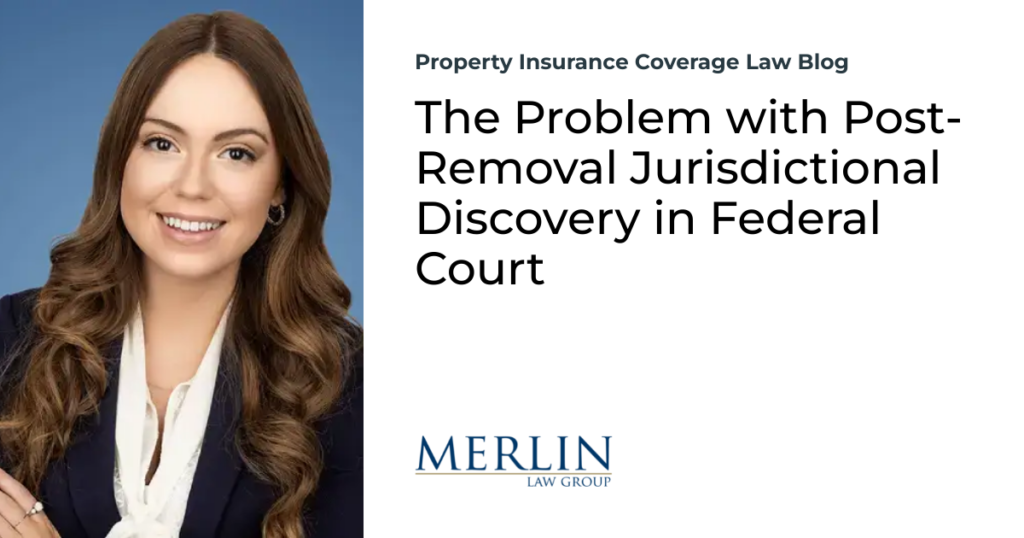The Problem with Post-Removal Jurisdictional Discovery in Federal Court

Lately, it seems defense counsel is removing nearly every insurance case to federal court. They usually accomplish this by asserting diversity jurisdiction. For those who aren’t familiar, federal diversity jurisdiction refers to a legal principle that allows civil cases involving parties from different states with more than $75,000 at stake to be heard in federal, rather than state, court. The party asserting federal jurisdiction exists bears the burden of proving it.
In my time as an attorney at Merlin Law Group, I have yet to litigate a case in state court because almost all our cases have been removed to federal court by insurers. This strategic move seeks to secure a more defense-friendly legal environment for insurance companies. Federal courts are perceived to be more conservative and predictable than state courts and apply more stringent rules regarding the scope and timing of discovery. These advantages allow insurers to better assess risk and minimize their exposure.
Recently, however, it seems the defense bar may have gotten a little too comfortable asserting federal jurisdiction. We recently encountered a case where we filed in state court, and defense counsel quickly removed to federal court. In this case, however, there was still a question as to the citizenship of the parties, which the federal court promptly pointed out. The trial court directed the Defendant to provide proof since it was the party asserting federal diversity. Defendant responded by filing a Motion to Conduct Limited Jurisdictional Discovery in an attempt to “prove” jurisdiction existed by shifting the burden onto the Plaintiff to figure out everyone’s citizenship.
We opposed the removal and the improper attempt at burden shifting by relying on a recent Kansas case, Guzman v. Well Health Labs LLC,1 to support our position. In Guzman, the court recommended a case be remanded rather than conduct post-removal jurisdictional discovery because:
Post-removal discovery disrupts the careful assignment of burdens and the delicate balance struck by the underlying rules. A district court should not insert itself into the fray by granting leave for the defendant to conduct discovery or by engaging in its own discovery. Doing so impermissibly lightens the defendant’s burden of establishing jurisdiction. A court should not participate in a one-sided subversion of the rules. The proper course is remand.2
The Guzman court was strongly swayed by the 11th Circuit’s distaste for post-removal jurisdictional discovery, articulated in Lowery v. Alabama Power Company.3 The Lowrey court noted such requests for discovery are “tantamount to an admission that the defendants do not have a factual basis for believing that jurisdiction exists.”
Thankfully, the magistrate judge in our case agreed with the Guzman court and recommended remand, agreeing with us that “Defendant’s attempt to utilize jurisdictional discovery as a means to rectify its own deficient jurisdictional allegations is an improper and abusive use of the discovery process.”4
We know, and insurance companies know, many of our cases will rightfully end up in federal court. But courts appear reluctant to carry Defendant’s burden of proving jurisdiction for them, or worse, shifting it onto the Plaintiff. Lowery and Guzman both highlight the need for balance and fairness in this process and send a clear message: If a party wants to assert diversity, they need to prove it.
1 Guzman v. Well Health Labs LLC, No. 22-2229, 2022 WL 17830765 (D. Kan. July 22, 2022).
2 Id. at *3 (quoting Lowery v. Alabama Power Co., 483 F.3d 1184, 1216 (11th Cir. 2007).
3 See also Nancy P. Assad Tr. v. Berry Petroleum Co., No. 13-CV-00544, 2013 WL 1151912 (D. Colo. Mar. 20, 2013).
4 Village Townhomes v. Allied World Surplus Lines Ins. Co., No. 23-2368 (D. Kan. Sept. 26, 2023).







